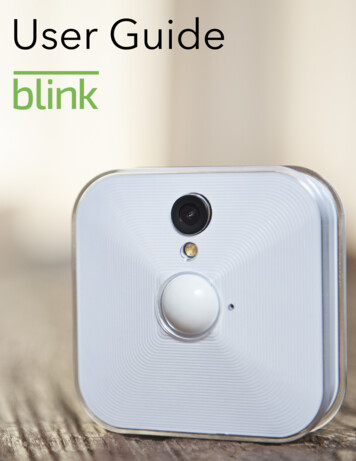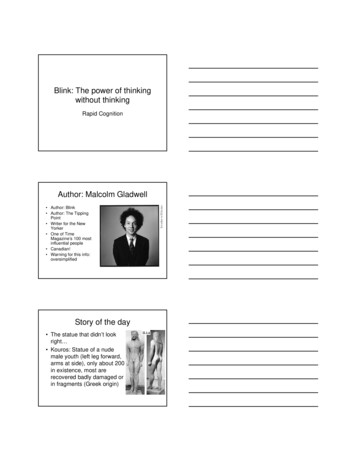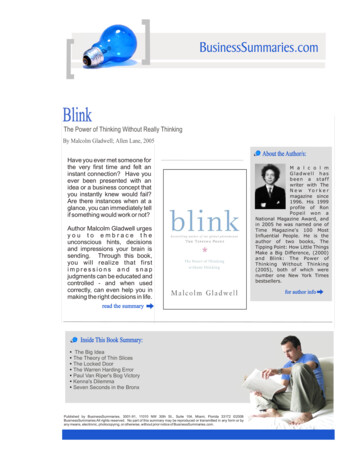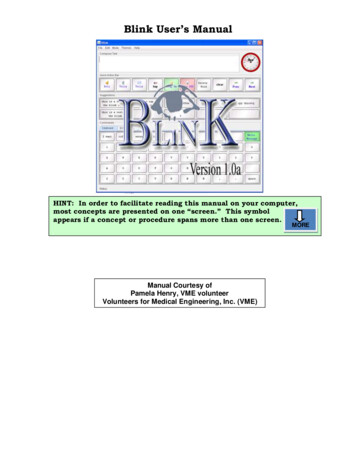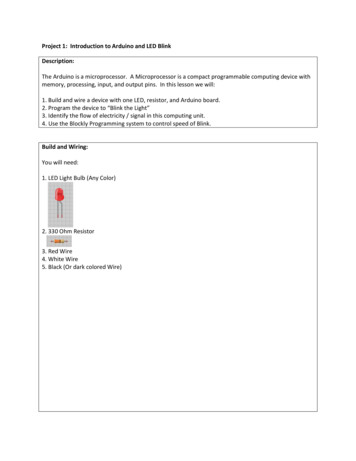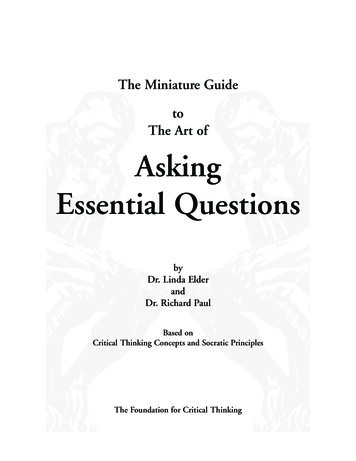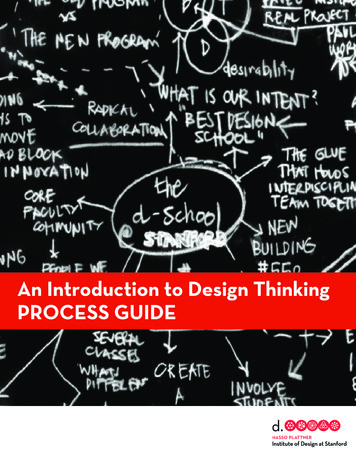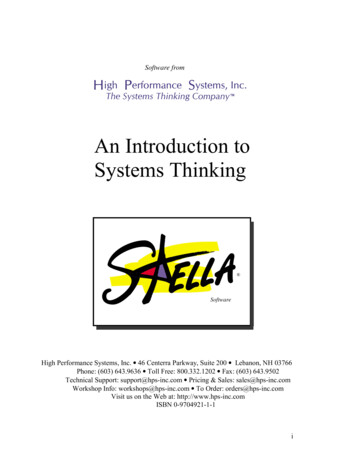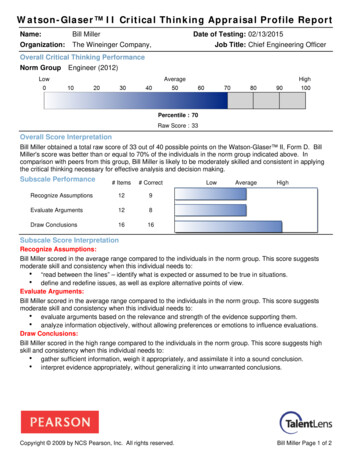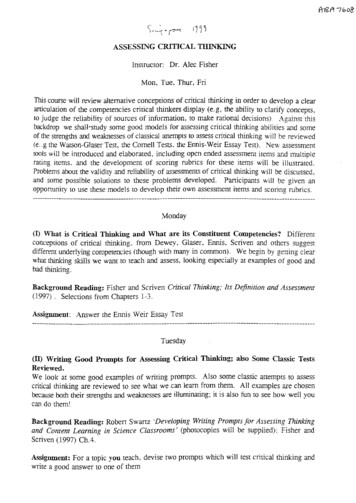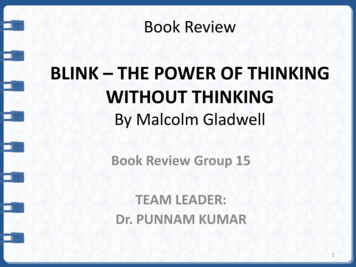
Transcription
Book ReviewBLINK – THE POWER OF THINKINGWITHOUT THINKINGBy Malcolm GladwellBook Review Group 15TEAM LEADER:Dr. PUNNAM KUMAR1
MALCOMGLADWELLBorn 3rd Sept, 1963 inHampshire United KingdomNon fiction writer, Journalist,Cultural Commentator,Intellectual AdventurerA staff writer with The NewYorker magazine since 19962
NOTABLE WORKSThe Tipping PointBlink : The Power of Thinking without ThinkingOutliers : The Story of SuccessWhat the Dog Saw: and other adventuresHow little things make a big difference3
AUTHOR’S STYLEUnexpected implications of research insocial scienceExtensive use of academic workEmphasis on works in sociology,psychology and socio psychology4
PURPOSE OF THE BOOKReal world examples on snapdecisions based on instinctsImportance of understandingone’s instinctsApplication of one’s instinctsin taking quick decisions andremoving our biases5
What happens to research then ?SnapDecisionsGoodDecisions?Trust onone’sinstincts6
Blink’s Proposition For a Differentand Better WorldDecisions made very quickly canbe every bit as good as decisionsmade cautiously and deliberatelyOur instincts fail us for specific andconsistent set of reasons. These reasonscan be identified and understood.The power of knowing, in first two seconds, isnot a gift given magically to a fortunate few. Itsan ability that we all can cultivate ourselves.7
Learning to BlinkArt of Thin Slicing Ability of our subconscious to find patterns insituations and behavior based on very narrowslices of experience Careful attention for two seconds can tell us anawful lot8
Thin Slicing ExperimentsThe Love LabExperimentWill marriagelast for 15years ?Nalini Ambady’sExperimentWhich doctorsare sued bypatients ?9
LOCKED DOOR OF OURUNCONSCIOUSNESSThe way wethink and act islot moresusceptible tooutsideinfluences10
Experiments on SubconsciousBarghExperimentPriming of Subconsciousness?TedWilliamsBest BaseballPlayer11
Blinking may lead us astray Our first impressions are generated by our experiences andenvironmentUnconscious forms opinions from our experiencesOur unconscious attitudes may have elements ofprejudice and discriminationThis influences our behavior in certain spontaneoussituationsANDwe may not be aware about it !!!12
The state of our subconscious IAT TestDo we havebiases ?WarrenHarding ErrorOne of the worstPresident ofAmerican history13
Blinking under decisive situationsDecision makingrelies on balancebetween deliberateand instinctivethinkingFrugality ofinformation mattersin taking snapdecisions14
Snap Decisions provides the edge Van RiperThe Generalwho defeatedthe U.S.A. ArmyCook County’sExperimentHeart AttackAlgorithm15
Importance of “Context”Pepsi vs.CokeThe NewCokeKenna’sAlbumMarketResearch16
Blinking can go wrong if WrongcontextSnapdecisionsDisaster17
Blink from mind blindness to mind readingMind readingfailures lie at rootof disagreements,misunderstandingand hurt feelingsFace signals canbe read tounderstand whatis going on insidemindUnder certaincircumstances ourmind becomesautisticHeart Ratebetween 115 and145 beats perminute improvesour performanceAbove 175 beatsper minute, ourcognitiveprocessing breaksdown and webecome useless!!!When makingsplit decisions, weare vulnerable tobeing guided byour stereotypesand prejudices18
What happens in 2 seconds ?WheelerAvenue TragedyPoliceencounterFACSMindreading19
Blink’s role to create an equitablesociety Abbie ConantepisodeClassicalmusicrevolutionThe bubblescoming out fromour subconsciouscan containelements ofprejudiceWe can control theenvironment inwhich rapidcognition takesplace and then,we can controlrapid cognition20
STRENGTHS OF THE BOOK Ventures into a relatively new psychologicalconcept called Adaptive Unconscious. Social agenda to correct our prejudices basedon past experiences or biased subconscious. Introduces concept of “thin- slicing” for takingsnap decisions. Sources data from varied and diverse fields togive more teeth to his findings.21
CRITICAL ANALYSIS States the obvious Analysis is superficialexamples to suit his theoryandcherrypicks The book gets repetitive and seems to behovering around only one theme Does not give concrete ways to develop orimprove our snap judgments22
CONCLUSIONExcellent book to peepinto our subconsciousthinkingIts applications can lead tocreation of a moreequitable societyWe can become betterhuman beings bybecoming more awareabout our behaviorsIntroduces art of “thinslicing” which CivilServants shouldextensively use to becomebetter administrators23
THANK YOU24
Book Review BLINK – THE POWER OF . Blink from mind blindness to mind reading Mind reading failures lie at root of disagreements, misunderstanding and hurt feelings Face signals can be read to understand what is going on inside mind Under certain circumstances our mind becomes autistic Heart Rate between 115 and 145 beats per minute improves our performance Above 175 beats per minute,
